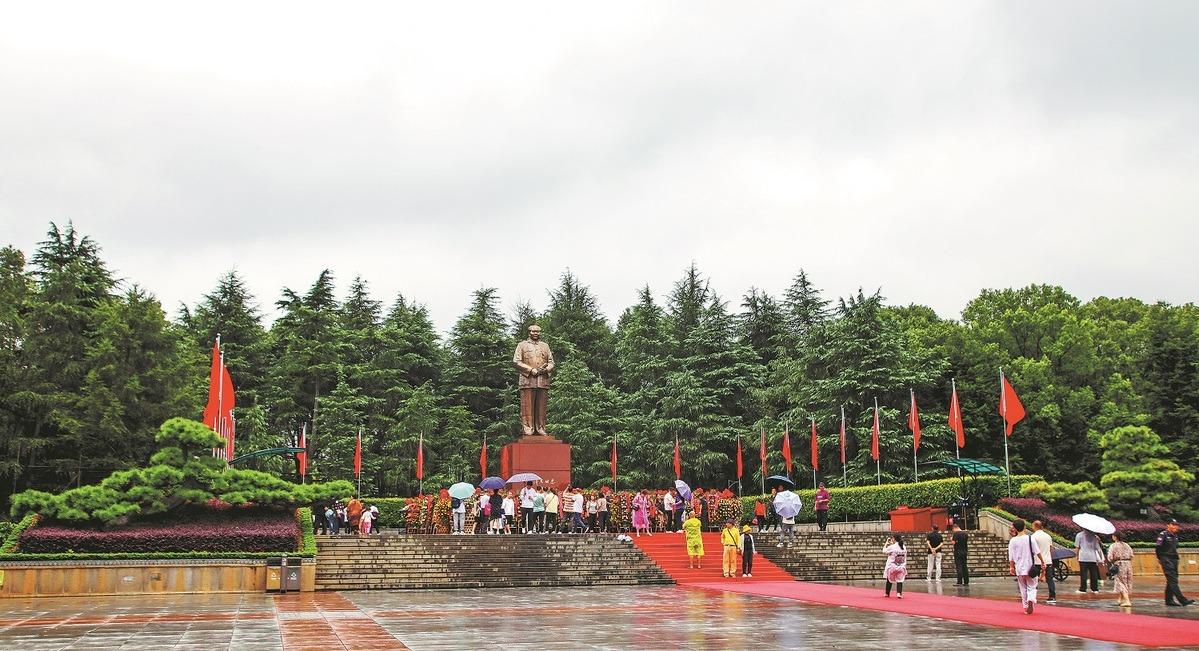 Tourists visit Mao Zedong Square in Shaoshan. Key scenic areas in the village, including the square and Mao's former residence, are national 5A-class attractions. (PHOTO / XINHUA)
Tourists visit Mao Zedong Square in Shaoshan. Key scenic areas in the village, including the square and Mao's former residence, are national 5A-class attractions. (PHOTO / XINHUA)
For 17-year-old Luo Yaqian, a two-day trip to the former residence of Chairman Mao Zedong in Shaoshan, Hunan province, inspired her to work hard to realize her goal of going to a reputable university.
The third-year student from Anhua No 2 High School in Yiyang, a city in Hunan, visited Shaoshan on Dec 11 on a trip organized by her school. All students from the school are due to visit Shaoshan in several groups.
During Luo's trip, the students visited Mao's former residence, his memorial hall and Mao Zedong Square. They also watched a movie and attended a lecture themed on Mao's younger days.
Luo said she was deeply inspired by the late Chinese leader. "Mao decided at an early age to leave his hometown to make a difference with his life. I am also determined to work hard and achieve good results in the national college entrance exam to realize my dream," she said.
We, the younger generation, will hold high the great banner, shoulder the responsibility to achieve national rejuvenation, remember the words of leaders, and follow the footsteps of the Communist Party of China.
Student visitors of Mao Zedong Square
In April, the authorities in Hunan launched a special study tour campaign for all primary and secondary school students to visit Shaoshan to make good use of the city's "red tourism" resources.
By the end of last month, more than 81,600 students had taken part in the study tours in 93 batches, local government figures show. The cost of these tours is covered by the government.
Mao, the People's Republic of China's first leader, was born in 1893 in Shaoshan village, about 100 kilometers from Changsha, capital of Hunan. He left his hometown for the first time when he was 17.
His former residence opened to visitors in 1951, since when increasing numbers have made pilgrimages to the mountainous village.
ALSO READ: China issues stamps to mark Mao's 130th birth anniversary
Shaoshan has become one of China's major red tourism attractions — places in which Chinese revolutionaries were born, lived or fought.
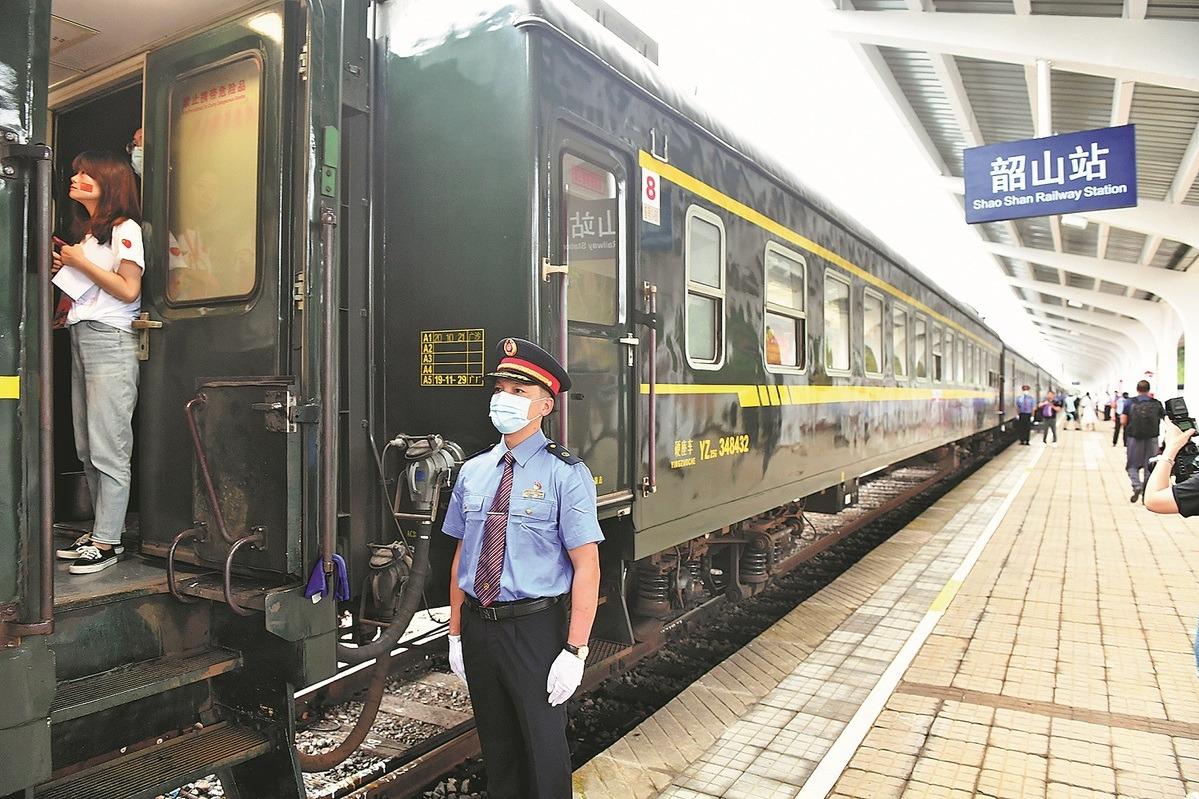 A train leaves Shaoshan for Jinggangshan in Xiangtan, Hunan province. (PROVIDED TO CHINA DAILY)
A train leaves Shaoshan for Jinggangshan in Xiangtan, Hunan province. (PROVIDED TO CHINA DAILY)
Key scenic areas in Shaoshan, including the square and Mao's former residence, have been upgraded to national 5A-class tourist attractions, the nation's top rating.
In Mao Zedong Square, the first stop on Luo's tour, she and her fellow students made a solemn vow.
"We, the younger generation, will hold high the great banner, shoulder the responsibility to achieve national rejuvenation, remember the words of leaders, and follow the footsteps of the Communist Party of China," the students said.
Luo said she had been taught about Mao by her parents and teachers since childhood, and the trip to Shaoshan reaffirmed her dream of becoming a servant for the people.
"I was impressed by the 73 patches on the late leader's pajamas. Although China has become wealthier, we should still reject self-indulgence and not waste things," she said.
Li Qingshan, 65, and his wife, Sun Zhuyun, 63, visited Shaoshan early this month from Qingdao, Shandong province, as they feared there would be too many visitors during the 130th anniversary of Mao's birth on Dec 26.
People of my generation have lived through tough times, so we have deep feelings for Chairman Mao. He was a savior. Without him, we would not have been able to dream of living happy lives today.
Sun Zhuyun, 63-year-old Shaoshan vistor
It was Li's second visit to Shaoshan, following one he made in the 1990s. "Shaoshan has definitely improved greatly over the years, and the local environment, roads and scenic spots are now much better," he said.
Li, who served in the military in Shenyang, Liaoning province, for several years in the late 1970s, admires Mao's skills as a military leader. "He was a true leader of the Chinese people, and dedicated himself to changing their destiny," he said.
When the couple arrived in the square, it was already packed with visitors waiting their turn to bow three times in tribute to Mao.
ALSO READ: Popularity of Red tourism jumps among Chinese youth
Some visitors paid for a two-man military-style escort to guide them to the foot of Mao's statue. After Li and his wife bowed three times to the statue, they had tears in their eyes.
Sun said: "People of my generation have lived through tough times, so we have deep feelings for Chairman Mao. He was a savior. Without him, we would not have been able to dream of living happy lives today."
Although today's living standards are much better than those in the past, she said people cannot forget the sacrifice made by Mao and other revolutionary leaders.
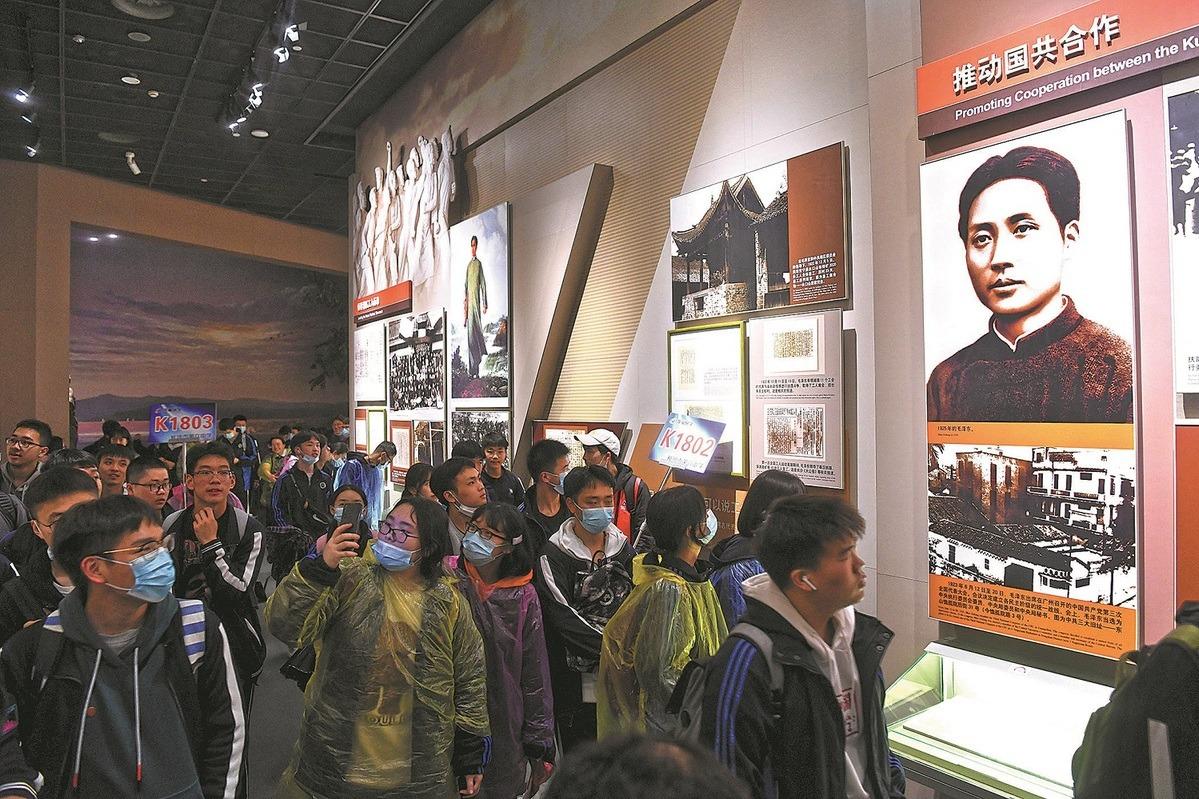 The interior of Shaoshan Mao Zedong Memorial Museum. (PROVIDED TO CHINA DAILY)
The interior of Shaoshan Mao Zedong Memorial Museum. (PROVIDED TO CHINA DAILY)
Childhood idol
Chen Jin, a second-year high school student from Sangzhi county, Zhangjiajie city, Hunan, said Mao has been his idol since childhood, as his grandfather often told him stories of the late leader.
Mo Hongqiu, vice-principal of Sangzhi No 1 High School, said it is very important for young students to take part in study tours to learn from Mao's experiences. Students from the school are due to visit Shaoshan in three groups
Visiting Shaoshan early this month with more than 1,000 of his fellow students on a trip organized by his school, Chen said, "I want to learn from Mao's fighting spirit, dedication to the people, and strength in the face of adversity, all of which are valuable lessons for young people.
"I also want to thank him for founding New China and changing the lives of Chinese people so that we now lead better lives."
Mo Hongqiu, vice-principal of Sangzhi No 1 High School, said it is very important for young students to take part in study tours to learn from Mao's experiences. Students from the school are due to visit Shaoshan in three groups.
The "red spirit" is deeply rooted in Chinese people's minds and should be passed on generation after generation, Mo added.
In addition to learning in class, study trips can help students gain a deeper understanding of the lives of revolutionaries, Mo said.
Guo Weiguo, director of the Shaoshan culture, tourism, radio and television, sports bureau, said the local tourism industry has witnessed a rapid recovery this year from the COVID-19 pandemic.
ALSO READ: Red tourism promotes prosperity in village
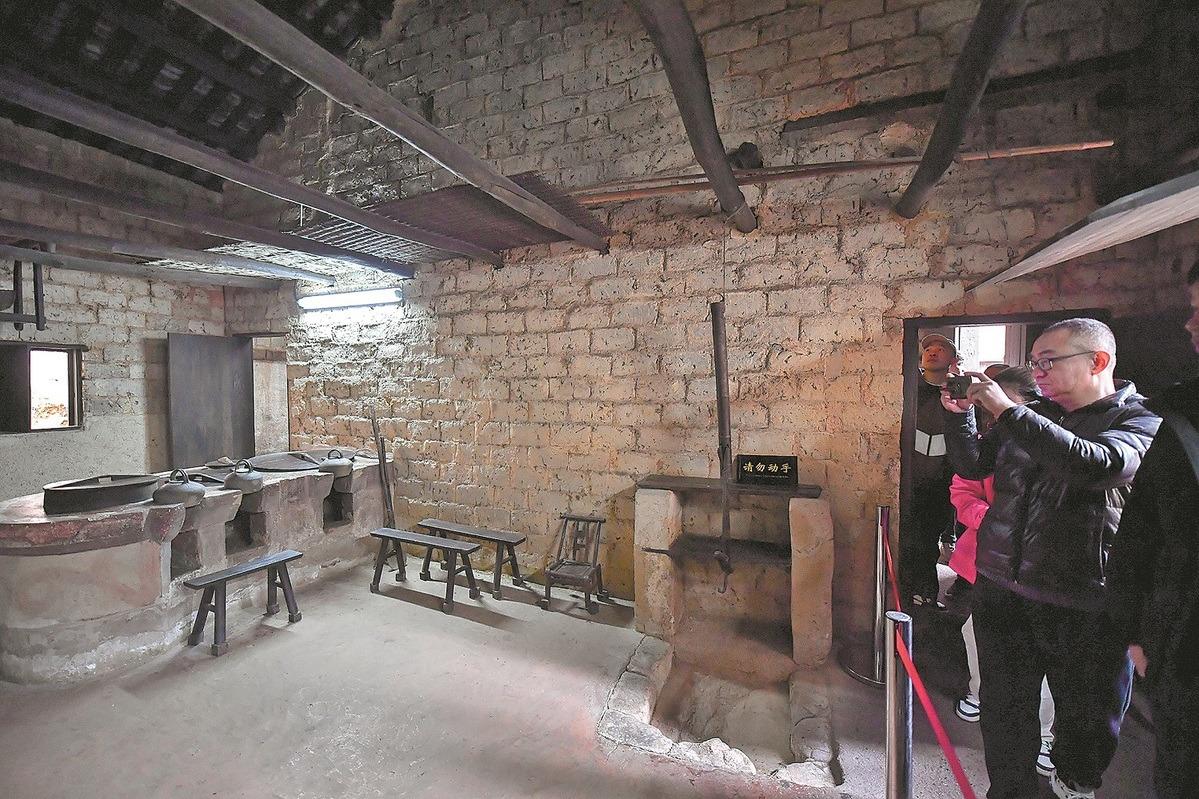 Visitors take photos inside Mao's former home. (PHOTO / XINHUA)
Visitors take photos inside Mao's former home. (PHOTO / XINHUA)
Shaoshan received more than 6.52 million visitors from January to last month, a rise of 377 percent from last year and 13.6 percent from 2019. Tourism revenue during this period reached more than 5.5 billion yuan ($771.1 million), a rise of 374 percent from last year and 13 percent from 2019.
Guo said two of the most popular live shows about Mao's life were performed 1,184 times from January to last month, attracting audiences of nearly 400,000, with ticket sales standing at 45 million.
The tourism boom has also helped local villagers escape poverty and live improved lives.
Shaoshan received more than 6.52 million visitors from January to last month, a rise of 377 percent from last year and 13.6 percent from 2019. Tourism revenue during this period reached more than 5.5 billion yuan ($771.1 million), a rise of 374 percent from last year and 13 percent from 2019
The villagers earn money by escorting visitors curious about Mao's birthplace, or those who want to experience the revolutionary times of years gone by.
Most of the villagers earn a decent living from tourism by running restaurants or inns, and selling Mao badges or statuettes as souvenirs.
Income rises
Mao Chunshan, Party secretary of Shaoshan village, said locals make money by opening eateries, homestays and shops selling souvenirs.
Some 70 percent of residents in Shaoshan village work in the tourism industry. They have opened nearly 200 homestays, along with restaurants and travel agencies, he said.
The villagers' average annual income rose to 35,000 yuan in 2021, up by 113 percent from 10 years ago, he said, adding, "Our income has risen year by year and our lives are better day by day."
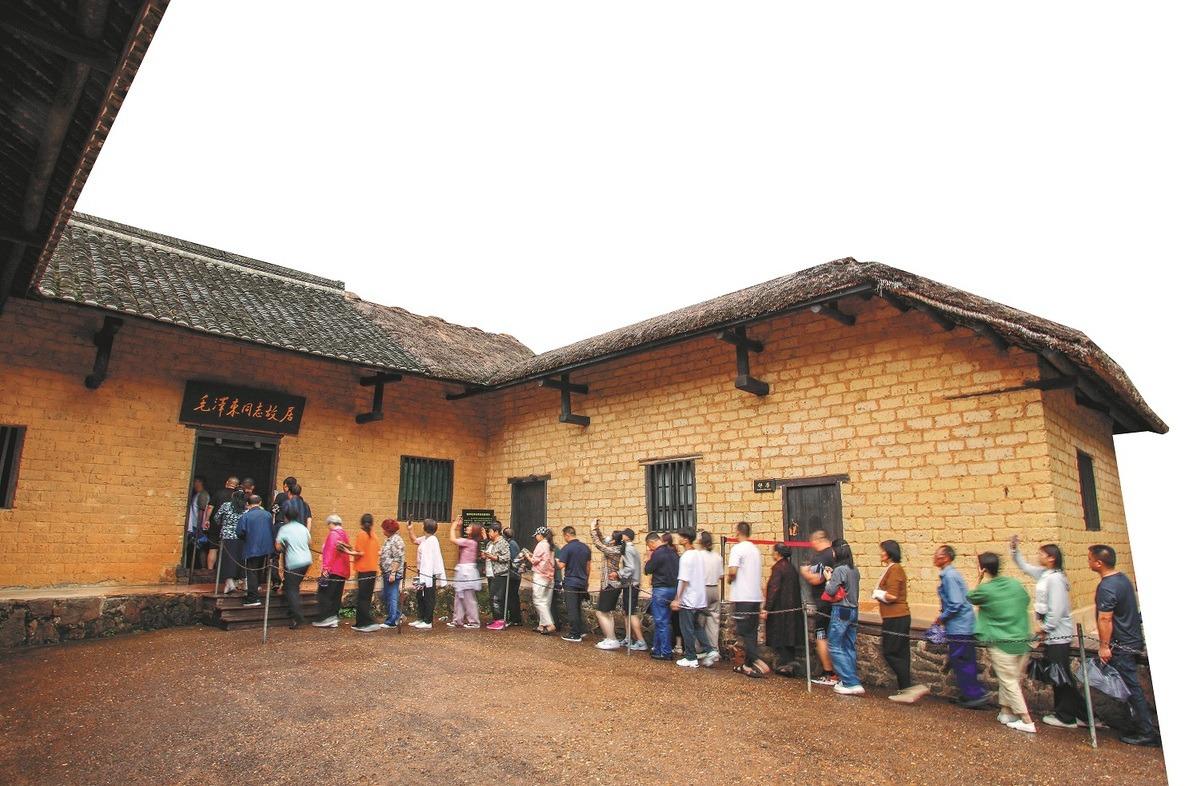 Tourists line up to visit Mao's former residence in Shaoshan. (PHOTO / XINHUA)
Tourists line up to visit Mao's former residence in Shaoshan. (PHOTO / XINHUA)
Villagers benefit from free medical care, Mao Chunshan said. The village authorities also give 600 to 900 yuan to elderly people every year, and all students admitted to universities receive cash awards of 4,000 to 6,000 yuan, he added.
After renovating his old house, which is only about 1.5 km from Mao Zedong's former residence, Shen Chuhua, 40, returned to Shaoshan from Changsha in 2019 to open a homestay to cash in on the tourism boom.
Shaoshan villagers' average annual income rose to 35,000 yuan in 2021, up by 113 percent from 10 years ago, he said, adding, "Our income has risen year by year and our lives are better day by day"
He collected items used in the 20th century from villagers to make the homestay more "old-school". Statuettes of Mao Zedong also remind travelers of the old days.
"Many of our guests are either the elderly or young people accompanying seniors. Older people, who have deeper feelings toward the late Chinese leader, want to realize their dreams of visiting his former residence," Shen said.
READ MORE: Red tourism, family outings fuel holiday travel surge
Some of Shen's guests are foreigners with a deep respect for Mao Zedong, who want to see where he lived during his youth.
Shen said he was especially impressed when a young girl from Jiangmen, Guangdong province, told him stories of Mao Zedong and recited his poems.
Many young people also visit Shaoshan because they want to learn about Mao Zedong, and try to emulate his greatness, Shen said.
"I was born in Shaoshan, and the lullabies I listened to in my childhood were all revolutionary songs, so my feeling for Mao is deeper than most people of my generation," he said.
The homestay initially only had five rooms, but Shen later added another six. It also offers catering services to travelers.
Shen said revenue from the business is expected to reach more than 600,000 yuan this year.
"Chairman Mao has blessed Shaoshan. He has saved us and benefited us. If it were not for him, no one would know anything about Shaoshan," he added.


